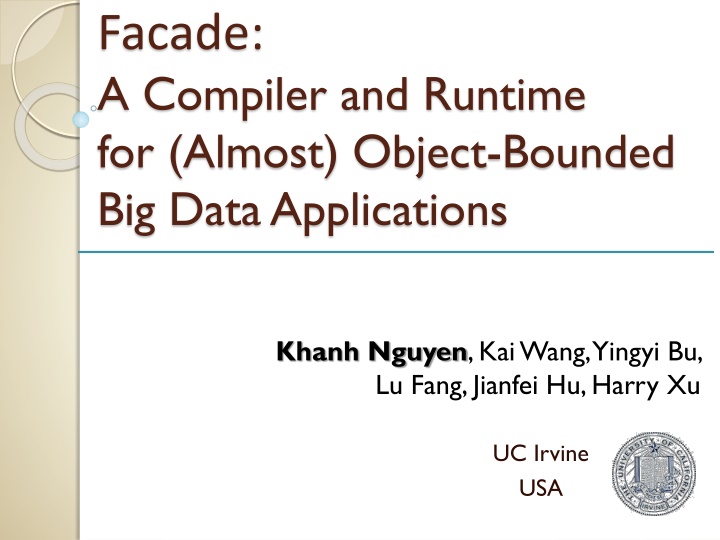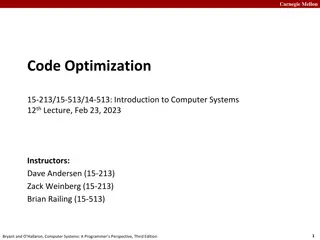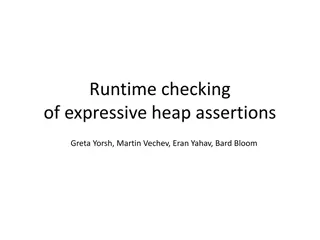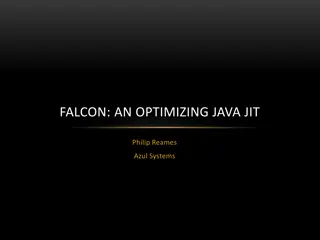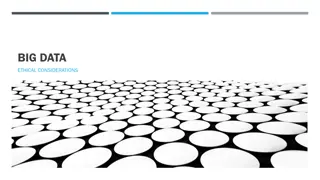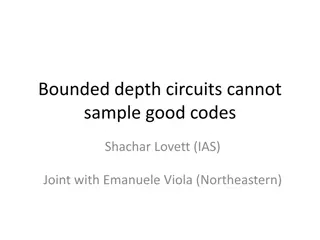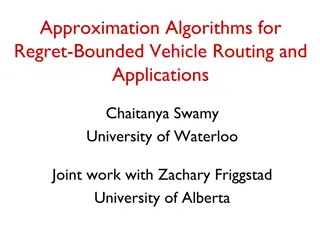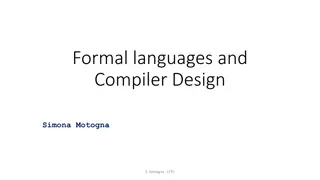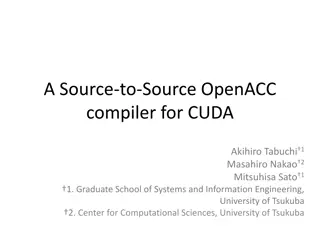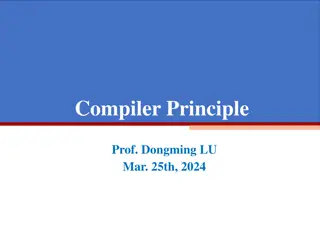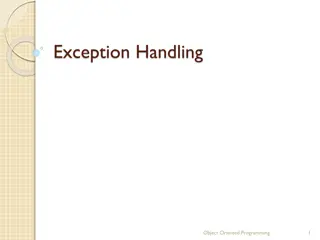Facade: A Compiler and Runtime for Object-Bounded Big Data Applications
Facade is a compiler and runtime designed to address challenges related to big data applications, focusing on reducing GC time, memory consumption, and access costs while improving scalability. The system utilizes off-heap native memory and bounded object pooling techniques to enhance performance and efficiency.
Download Presentation

Please find below an Image/Link to download the presentation.
The content on the website is provided AS IS for your information and personal use only. It may not be sold, licensed, or shared on other websites without obtaining consent from the author.If you encounter any issues during the download, it is possible that the publisher has removed the file from their server.
You are allowed to download the files provided on this website for personal or commercial use, subject to the condition that they are used lawfully. All files are the property of their respective owners.
The content on the website is provided AS IS for your information and personal use only. It may not be sold, licensed, or shared on other websites without obtaining consent from the author.
E N D
Presentation Transcript
Facade: A Compiler and Runtime for (Almost) Object-Bounded Big Data Applications Khanh Nguyen, Kai Wang, Yingyi Bu, Lu Fang, Jianfei Hu, Harry Xu UC Irvine USA
BIG DATA Scalability JVM crashes due to OutOfMemory error at early stage High cost of the managed runtime is a fundamental problem! Management cost GC time accounts for up to 50% of the execution time [Bu et al. ISMM 13]
Golden rule for scalability The number of heap objects and references must notgrowproportionally with the cardinality of the dataset Non-intrusive technique Statically bound the number of data objects in the heap Operate at compiler level General and practical Require minimal user s effort
Facade execution model Use the off-heap, native memory to store unbounded data items Create heap objects only for control purposes Bounded object pooling Many to One
Benefits from Facade Significantly reduced GC time Reduced memory consumption Reduced memory access costs Reduced execution time Improved scalability
Static bound of data objects O(s) s : cardinality of the data set O(t*n+p) t : number of threads n : number of data types p : number of pages 14,257,280,923 1,363 Org. (GraphChi OSDI 12) Facade
Data representation Native memory name id students Memory address is used as object reference (pointer)= pageRef
Data manipulation D user-specified data class DF Facade class automatic Object references are substituted by pageRef Professor p = f; long pRef = fRef; Objects are created as facades for control purposes
p.addStudent(s); Have only pRef and sRef ProfessorFacade pf = professorPool[0]; StudentFacade sf = studentPool[0]; pf.pageRef = pRef; sf.pageRef = sRef; pf.addStudent(sf); void addStudent(StudentFacade sf) { long thisRef = this.pageRef; long sRef = sf.pageRef; //... }
Orig. p.addStudents (s1,s2,s3,s4,s5) Facade pf.addStudents (sf1,sf2,sf3,sf4,sf5) pf = professorPool[0]; statically created; bounded by the max # operands of type Professor/ Student sf1 = studentPool[0]; sf2 = studentPool[1]; sf3 = studentPool[2]; sf4 = studentPool[3]; sf5 = studentPool[4];
Challenge 1 Dynamic dispatch Use type ID in the record s header Parameter facade pool Separated receiver facade pool p.addStudent(s); ProfessorFacade pf = FacadeRuntime.resolve(pRef);
Challenge 2 Concurrency: Thread-local facade pooling Global lock pool to support object locks Object locks Get a free lock l from the lock pool; Write l into the lock field of oRef l.compareAndInc(); enterMonitor(l); exitMonitor(l); if(l.compareAndDec() == 0){ Write 0 into the lock field of oRef return l to the pool;} enterMonitor(o); exitMonitor(o);
Memory management Allocation High-performance parallel allocator Thread-local managers Uses different size classes Insights: Data-processing functions are iteration-based Each iteration processes distinct data partition Data objects in each iteration have disjoint lifetime Deallocation Use a user-provided pair of calls to recycle pages: iteration_start() && iteration_end() Iterations are well-defined --- it took us only a few minutes to find iterations and insert callbacks in GraphChi
Other supports Optimizations: Object inlining for records whose size is known statically Oversized pages for large arrays Type specialization Support most of Java 7 features Details can be found in the paper
Experiments 3 frameworks, 7 applications GraphChi[Kyrolaet al. OSDI 12] High-performance graph analytical framework for a single machine Hyracks[Borkaret al. ICDE 11] Data parallelplatform to run data-intensive jobs on a cluster of shared-nothing machines GPS[Salihoglu and Widom SSDBM 13] Distributedgraphprocessing system for large graphs
GraphChi 1.4 Page Rank 1.2 1 4G 6G 8G 0.8 0.6 0.4 0.2 0 Total time Update time Load time GC time Memory 1.4 Connected Component 1.2 1 4G 6G 8G 0.8 0.6 0.4 0.2 0 Total time Update time Load time GC time Memory
GraphChi - Throughput 15 X 105 Throughput (edges/sec) 13 11 Facade 9 7 Original 5 3 PR CC PR' CC' Number of edges x 108 1 1 3 5 7 9 11 13 15 17
Hyracks 1.4 1.2 External Sort 1 Total time GC time Memory 0.8 0.6 0.4 0.2 0 3G 5G 10G 14G 19G 8 Memory Usage (GB) 6 Word Count The original program crashed in all of these sets thus no figure 4 2 0 3G 5G 10G 14G 19G Original Facade
GPS Page Rank, KMeans & Random Walk Reduction in largest graph: 120M vertices, 1.7B edges 35 % 32.1 30 30.8 25 23.1 20 17.3 15 13.5 10 10.9 5 0 PageRank KMeans RandomWalk PageRank KMeans RandomWalk
GPS Page Rank, KMeans & Random Walk Average cumulative reduction % % 35 5 30 4.47 30.31 4 25 3.43 3 20 2.75 15 2 15.63 10 1 8.87 5 0 0 PageRank KMeans RandomWalk PageRank KMeans RandomWalk
Results GraphChi (Page Rank & Connected Components) Up to 6.4x reduction in GC time Up to 28% reduction in memory usage (6+GB datasets) Up to 48% reduction in execution time 1.4x improvement in throughput Hyracks (Word Count & External Sort) 3.8x improvement in scalability Up to 88x reduction in GC time Up to 32% reduction in memory usage Up to 10% reduction in execution time GPS (Page Rank, KMeans & Random Walk) Up to 40% reduction in GC time Up to 15% reduction in execution time
Conclusion Facade is a complete package: Compiler: automatically transform existing programs Runtime system: run on top of JVM, i.e., no modification of JVM Thank you!
